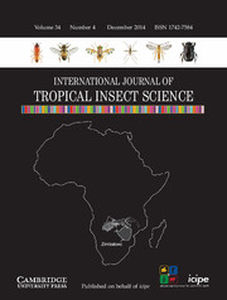Article contents
Relative toxicity of neem to natural enemies associated with the chickpea ecosystem: a case study
Published online by Cambridge University Press: 01 December 2007
Abstract
Neem products are often perceived as harmless to natural enemies, pollinators and other non-target organisms. For this reason, several integrated pest management (IPM) programmes have adopted neem as one of the prime components. This study revealed toxic effects of neem on soil-inhabiting and aerial natural enemies in chickpea to an extent of 41 and 29% population reduction, respectively, compared with 63 and 51% when using a conventional insecticide (endosulfan). Neem also affected the parasitization of Helicoverpa armigera (Hübner) larvae by Campoletis chlorideae Uchida up to 20%. The natural enemy population started building up from the vegetative phase and reached their peak during the reproductive phase, and there was a gradual decline from pod formation to pre-harvest phases of the crop. Adapting the currently used IPM system in chickpea using neem during the vegetative phase, followed by an application of Helicoverpa nuclear polyhedrosis virus (HNPV) at flowering and need-based application(s) of chitin inhibitors like novaluron or flufenoxuron instead of endosulfan during pod formation would strongly augment natural enemy populations. This paper discusses the relative toxicity of neem and other IPM components on soil-inhabiting and aerial natural enemies in the chickpea ecosystem.
- Type
- Research Paper
- Information
- International Journal of Tropical Insect Science , Volume 27 , Issue 3-4 , December 2007 , pp. 229 - 235
- Copyright
- Copyright © ICIPE 2008
References
- 2
- Cited by


